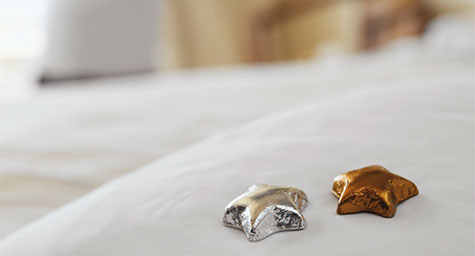Hotel Reviews and Loyalty Programs are Keys to Getting Business Travelers In the Door
Hotels want to stay at the top of travelers’ lists, but with so many factors today affecting where travelers select to stay, it can be hard for hotels to know what makes travelers book or look elsewhere. Luckily, a new study presented at the Hospitality Sales and Marketing Association International’s Revenue Optimization Conference offered insight into the factors and features that bring in business travelers. It featured some welcome news to smaller hotels on how the quality of their reputation was more important than the quantity of their properties. Considering how business travelers tend to take numerous trips each year, they serve as a steady source of bookings for hotels year-round, as well as a bounty of business in the off-season. That’s why hotel brands of all sizes need to understand what influences business travelers so they can work to earn their business. To see what business travelers check out before they check in, HotelNewsNow.com featured highlights from this hotel study.
“It is actually crucial these days to understand all the factors that may influence the willingness to buy so that as revenue managers, we can make the right pricing decisions, both tactically and strategically,” said Kelly McGuire, executive director at hospitality and travel global practice for SAS Institute and co-author of this new hotel study. “We look at our business in terms of our demand forecast and our pricing, but consumers buy a little differently. They’re looking at our price and our competitor’s price, but they’re really assessing value and quality.”
The new study focused on how reputation and price affect business travelers’ purchasing decisions. The researchers also used one of their prior studies on the booking patterns of leisure travelers for comparison.
For this study, the researchers examined more than 500 U.S. business travelers who took at least six trips a year and made their own reservations. These business travelers were asked to select from three hotels that had the same general levels of service, amenities, and equally good locations. The only variables were the hotel brand and the three review attributes of content, sentiment, and language.
After evaluating those elements, the researchers looked at loyalty programs because they knew that membership in these programs could strongly influence the business traveler’s decision. After all, these business travelers averaged 2.38 loyalty memberships and nearly half of them belonged to a loyalty brand that was not from a traditional hotel brand. So for the final stage of the study, they were asked to select from three hotels consisting of an unknown brand, a familiar brand that was not their preferred brand, and their preferred brand.
The results among business travelers revealed that the sentiment of a hotel’s reviews had the greatest impact on their choice. This was followed by brand name, overall ratings, hotel price, and then the language of the reviews.
In comparison, leisure travelers also valued the sentiment of the reviews above all other factors, followed by the hotel’s price, overall rating, TripAdvisor ranking, and brand name.
The main takeaways for hotel brands is that reviews truly matter to travelers, especially business travelers who take multiple trips each year and want to know the kind of experience to expect. And hotels can’t overlook loyalty membership since the promise of points is enough to make business travelers tolerate merely average accommodations and amenities. Finally, the draw of a deal can ultimately determine the business traveler’s hotel decisions.
The study gives smaller hotels hope that a great online reputation can be more compelling to travelers than a greater-sized property or brand presence.
It also shows that pricing is no longer a primary factor in a consumer’s decision. Today, a hotel’s reputation, reviews, and overall rating far outweigh the room rate.
As a result, some savvy hotel brands have redirected their focus toward reputation management. Loews is one hotel brand that is getting its revenue managers more involved in evaluating reputation-management data to determine pricing decisions. Earlier this year, Loews conducted research that showed how hotels that maintained strong online reputations were actually seeing the benefits through higher pricing structures.
Apparently, working to manage a hotel’s reputation and rewarding guests with loyalty programs really pay off when it comes to earning the business traveler’s business.
For more on hospitality marketing strategies, contact MDG today at 561-338-7797 or visit www.mdgsolutions.com.
MDG is a full-service advertising agency and one of Florida’s top branding firms. With offices in Boca Raton and New York City, MDG’s core capabilities include creative, branding, logo design, print advertising, digital marketing, mobile marketing, email marketing, media planning and buying, TV and radio, outdoor advertising, newspaper, video marketing, Web design and development, content marketing, lead generation, mobile marketing, social media marketing, and SEO. To discover the latest trends in branding and advertising, contact MDG today at 561-338-7797.

